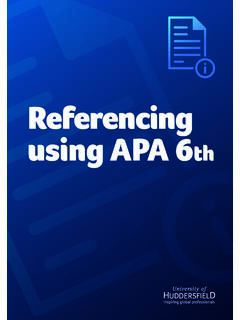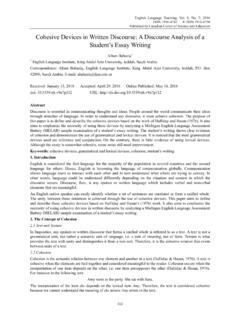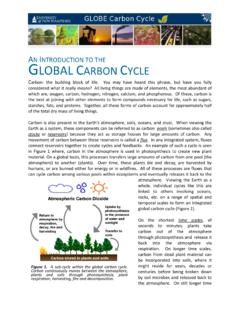Transcription of Referencing using APA 7th - Library Services
1 Referencingusing APA 7thUniversity of Huddersfield APA 7th Referencing Guide Last updated 18/02/22 1 Contents Introduction .. 5 Why reference? .. 6 When do you need to reference? .. 6 Principle of Referencing .. 7 Principle of citation .. 7 Quoting, paraphrasing and summarising .. 8 Quoting .. 8 Paraphrasing .. 9 Summarising .. 9 Citing more than one source to support an argument .. 9 Two or more citations by the same author .. 10 Secondary Referencing & citing .. 10 Guidance for citing different numbers of authors .. 11 Reference list .. 12 What is a reference list? .. 12 Sample reference list .. 13 Formatting the reference .. 14 Digital object identifier (DOI) .. 14 Missing information .. 15 General formatting rules .. 16 Further help .. 17 Official APA 7th guidance.
2 17 Help within the University of Huddersfield .. 17 1. Art .. 18 Artwork .. 18 Art online .. 19 Exhibit catalogue .. 19 Art exhibition .. 20 2. Books (print and ebooks) .. 21 Books with one or two authors .. 22 Books with three or more authors .. 22 Edited book .. 23 Chapter/ section of an edited book .. 24 A translated book .. 25 A book written in another language .. 26 University of Huddersfield APA 7th Referencing Guide Last updated 18/02/22 2 Reference books: dictionary, thesaurus or encyclopedia .. 26 Book 28 Religious work .. 29 3. Conference papers and poster sessions .. 30 Unpublished conference paper/ poster .. 30 Conference paper published online .. 31 4. Film, television, radio, video .. 32 Film .. 32 Television: single programme.
3 33 Television: single episode of a television series .. 33 Radio broadcast .. 34 Streamed video: YouTube .. 35 Podcast .. 36 Single episode from podcast .. 37 5. Financial data .. 38 6. Images (including photographs, illustrations).. 39 Images from a book .. 39 Images from an online collection .. 41 Images from a website .. 42 7. Journals, trade publications or magazines .. 43 Journal article with one or two authors .. 43 Journal articles with three to twenty authors .. 44 Journal article with twenty-one or more authors .. 45 Magazine .. 46 8. Law .. 48 Cases (law reports) .. 48 Acts of Parliament .. 48 9. Leaflets, pamphlets, brochures .. 49 10. 50 Printed maps .. 50 Online maps: Google .. 51 Digimap Ordnance Survey .. 51 Digimap Historic.
4 52 Digimap Geology .. 53 Digimap Environment .. 53 11. Music/ sound recording .. 55 University of Huddersfield APA 7th Referencing Guide Last updated 18/02/22 3 Album .. 55 Single track .. 55 Live performances .. 57 Music score .. 58 12. Newspaper articles .. 59 13. Official publications .. 61 Government reports .. 61 Hansard .. 62 NICE guidelines/ guidance .. 63 14. Personal communication .. 64 Telephone calls/ emails/ personal interviews .. 64 15. Reports .. 65 Company reports .. 65 Market research report .. 65 Ofsted reports .. 66 16. Computer code, software & apps .. 67 Computer code .. 67 Software/ apps .. 68 17. Social media .. 69 Twitter .. 69 Facebook .. 70 Instagram .. 71 18. Standards and patents .. 72 Standard.
5 72 Patents .. 73 19. Tables/ graphs and figures .. 74 20. Theatre .. 75 Live production .. 75 Theatre programmes .. 76 21. Theses and dissertations .. 77 Printed dissertation/ thesis .. 77 Online dissertation/ thesis .. 78 22. Brightspace: lecture notes, module handbooks .. 79 23. Websites and blogs .. 80 Website .. 80 Blogs .. 81 University of Huddersfield APA 7th Referencing Guide Last updated 18/02/22 4 24. Further help .. 82 Official APA 7th guidance .. 82 Help within the University of Huddersfield .. 82 University of Huddersfield APA 7th Referencing Guide Last updated 18/02/22 5 Introduction When you have included anything from published sources in your work, you must acknowledge it fully and accurately by: identifying your sources, in a brief format, in the body of your written work (referred to as an in-text citation).
6 Providing a detailed list of your sources in alphabetical order at the end of your work (known as a reference list). The University Referencing style is APA 7th, published by the American Psychological Association. Key changes from APA 6th to 7th are summarised below: APA 6th (old version) APA 7th (new version) et al was only used after five or more authors in the first in-text citation. In-text citations of a work by three or more authors lists only the first author, followed by et al . Maximum 7 authors for a single work were listed in the reference list. Up to 20 authors for a single work can be listed in the reference list. Book references had to include publisher location as well as publisher name ( Abingdon: Taylor & Francis). Book references only require publisher name, not location ( Taylor & Francis).
7 If organisation and publisher were the same, both were included. If organisation and publisher are the same, omit the publisher. URLs were always preceded with Retrieved from . URLs are no longer preceded by Retrieved from . URLs did not require a retrieval date. If using an unstable URL, include a retrieval date in the following format: Retrieved July 31, 2020, from URLs were not live hyperlinks ( ). URLs should be live hyperlinks ( ) if final document is read online. URLs should not be live hyperlinks if final document is in a printed format. Some departments use slightly varying rules, so always check your module handbook. University of Huddersfield APA 7th Referencing Guide Last updated 18/02/22 6 Why reference? Referencing is important in all academic work for the following reasons: to show that you have researched/ read widely and found relevant information.
8 To support any claims you have made through reference to an authoritative author on the subject. to enable readers of your work to trace the sources used and draw their own conclusions from the original works which you have cited. Referencing is generally part of the mark scheme for your assignments. to avoid being accused of plagiarism. This is using someone else's work as your own without acknowledging it. If you do not acknowledge your source(s) you may be guilty of academic misconduct. For more details, please refer to the Regulations for taught students - Academic Misconduct When do you need to reference? You should acknowledge your source with a reference whenever you include: mention of a theory, fact, argument or viewpoint attributable to a specific person.
9 Statistics, examples or case studies. illustrations or musical examples. direct quotations/ paraphrase. Common knowledge is information that is generally known to a reader so does not require a reference, Paris is the capital of France. Water is H20. If in doubt as to whether something is common knowledge or not, please refer to an academic in your department. University of Huddersfield APA 7th Referencing Guide Last updated 18/02/22 7 Principle of Referencing The principle of Referencing is to answer these basic questions about your sources: There will not be specific guidance for every single source type. Sometimes you may need to find the source that is the closest fit . This may mean using elements from two source types.
10 These APA 7th reference examples or the printed Publication manual of the American Psychological Association: the official guide to APA style (7th edition) are very useful for unusual reference types. Principle of citation The principle of citation is to acknowledge the source in the body of the written work. It provides information for the reader to locate the source in the reference list. When you are writing you can choose the most appropriate place to add the citation, see below for the most common examples. Full citation in brackets at the end of the sentence, better assessment of the slope stability (Singh et al., 2013, p. 264)..supporting the children s literacy (UNICEF, 2020). Matheus and Quinn discuss gender based occupational (2017) Whowrote it?







